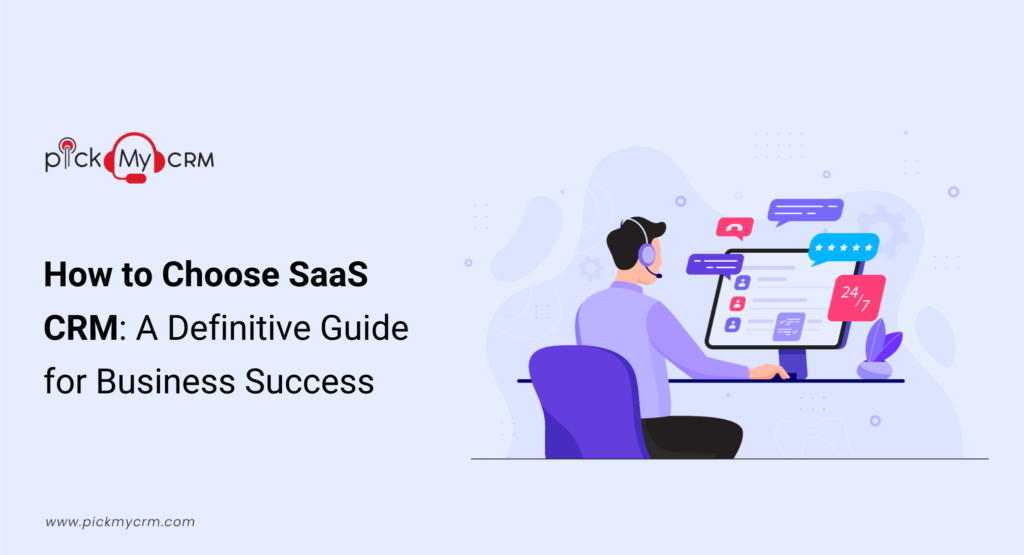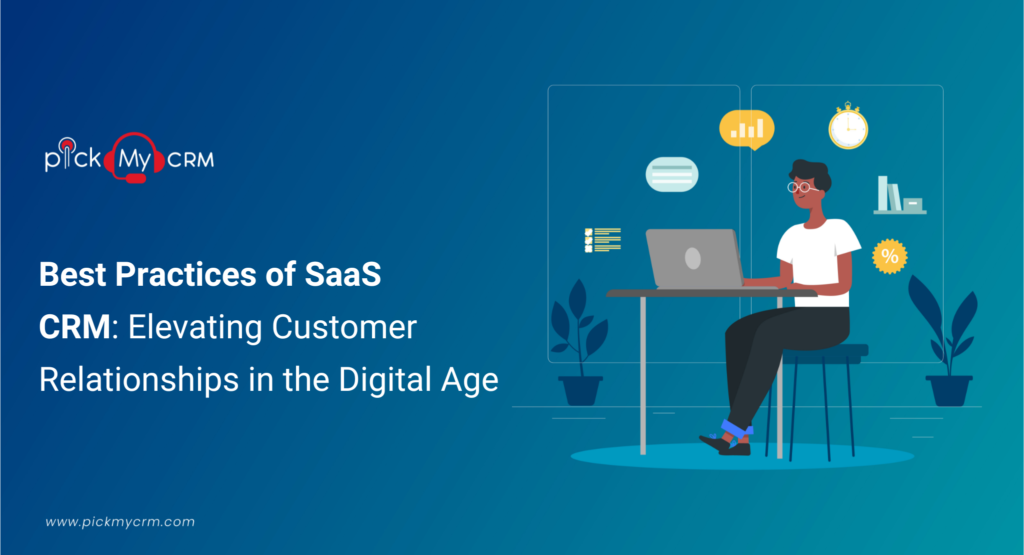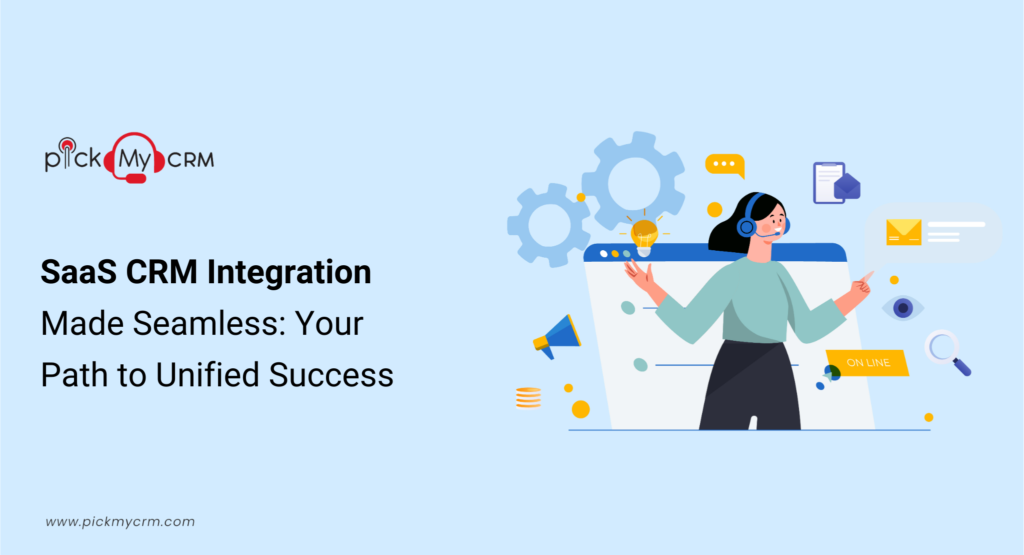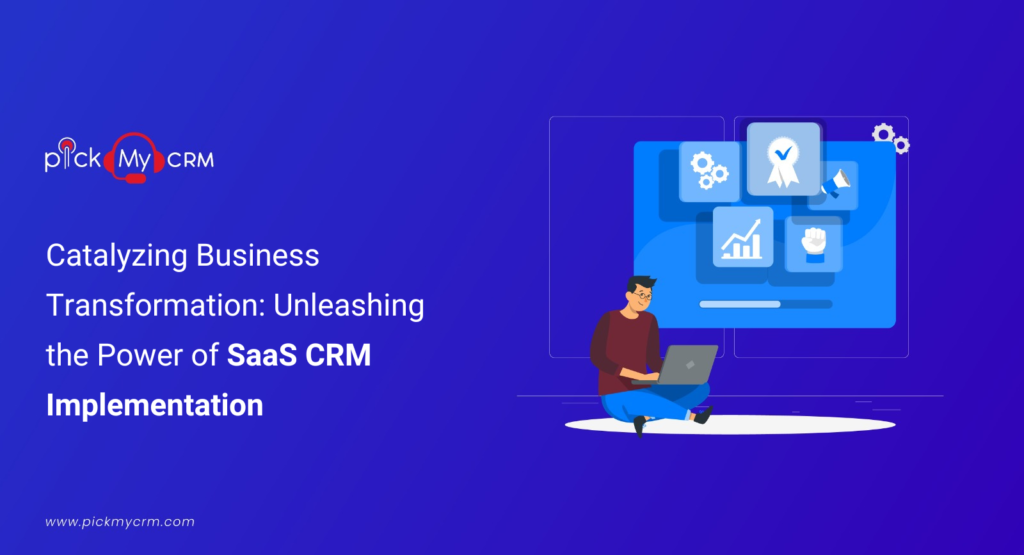How to Choose SaaS CRM: A Definitive Guide for Business Success
Understanding the Importance of SaaS CRM
Before delving into the selection process, it's essential to grasp the significance of a SaaS CRM system. SaaS CRM software offers several advantages,- Accessibility: SaaS CRMs are cloud-based, enabling access from anywhere with an internet connection. This accessibility is especially valuable in today's remote work environment.
- Scalability: SaaS CRMs can grow with your business. You can easily add new users and features as your company expands.
- Cost-Efficiency: Compared to traditional CRM solutions, SaaS CRMs typically have lower upfront costs and predictable monthly fees, making them budget-friendly.
- Automatic Updates: SaaS CRM providers regularly update their software, ensuring you always have access to the latest features and security enhancements.
How to Choose a Saas CRM: Here are 7 Steps
Finding the perfect SaaS CRM software is a crucial process that can significantly impact your business's success. To help you in this endeavor, here are explanations of the seven steps,Identify your Business Needs
Start by clearly identifying the specific requirements and goals of the business. Determine which aspects of CRM are essential for your operations, such as sales management, marketing automation, customer support, analytics, or integrations. This step ensures that you have a Clear focus on What you expect from the CRM software. Consider these essential factors,Business Size and Complexity
Your organization's size and complexity play a significant role in CRM selection. Small businesses may require a straightforward CRM, while larger enterprises often need advanced features like workflow automation and integration with other software.Industry and Niche
Some SaaS CRM solutions cater to specific industries or niches. Determine whether there are industry-specific features you need, such as compliance tools for healthcare or lead tracking for sales.User-Friendliness
Factor in user-friendliness, as it can significantly affect user adoption. A user-friendly interface can reduce training time and boost productivity.Integration Capabilities
Ensure that the SaaS CRM can integrate seamlessly with your existing software stack. Compatibility with tools like email marketing platforms, accounting software, and e-commerce systems is crucial.Mobility
If your team is often on the go, mobile compatibility is vital. Check whether the CRM offers mobile apps or a responsive web interface for smartphones and tablets.Research reputable software options
Conduct thorough research to identify reputable SaaS CRM software providers in the market. Explore software review websites, industry publications, and customer testimonials to gather insights and user reviews. Pay attention to factors Such as overall ratings, customer satisfaction, and feedback on specific features or functionalities. Here are some reputable SaaS CRM software options that you can consider based on various business needs and requirements,Salesforce CRM
- Key Features: Comprehensive suite for sales, marketing, and customer service; scalability for businesses of all sizes; robust analytics and customization options; integration with various third-party apps.
- Ideal for: Large enterprises looking for a highly customizable and feature-rich CRM solution.
HubSpot CRM
- Key Features: Free CRM with powerful marketing and sales automation tools; ideal for small to medium-sized businesses; user-friendly interface; integration with HubSpot's marketing and sales software.
- Ideal for: Small to medium-sized Businesses seeking an all-in-one solution for marketing and sales.
Zoho CRM
- Key Features: Known for affordability and scalability; offers automation, analytics, and multi-channel communication; suitable for businesses of all sizes.
- Ideal for: Budget-conscious Businesses looking for a feature-rich CRM.
Pipedrive
- Key Features: User-friendly CRM designed for sales teams; focuses on pipeline management; excellent customization options.
- Ideal for: Sales-focused Teams and businesses that require a simple and intuitive CRM.
Freshsales
- Key Features: CRM for high-velocity sales teams; AI-powered features, email tracking, and lead scoring; customizable and user-friendly.
- Ideal for: Businesses focused on rapid sales growth and automation.
Zendesk Sell (formerly Base CRM)
- Key Features: CRM designed for sales professionals; sales automation, reporting, and lead management features; user-friendly and mobile-friendly.
- Ideal for: Sales teams that need a mobile-friendly CRM for on-the-go sales activities.
Evaluate Features and Customization
Once you have shortlisted potential CRM software options, evaluate their features and customization capabilities. Evaluate their alignment with your business processes and assess their configurability to meet your requirements. Consider aspects such as contact management, sales pipeline management, marketing automation, customer support, analytics, and reporting.Consider integration capabilities
Integration capabilities are crucial for seamless data exchange and workflow optimization. Check whether the CRM software integrates smoothly with other essential tools your business relies on, such as email marketing platforms, e-commerce systems, project management software, or customer support systems. Strong integration capabilities enhance efficiency and provide a holistic view of customer interactions.Review Pricing and Scalability
Salesforce CRM
- Pricing: Salesforce offers a variety of pricing plans, including Essentials, Sales Professional, and Enterprise. Prices can range from $25 per user per month to over $300 Per user Per month.
- Scalability: Salesforce is highly scalable and can accommodate the needs of Small businesses to Large enterprises.
HubSpot CRM
- Pricing: HubSpot CRM is free to use, which makes it an attractive option for small businesses. However, if you need more advanced marketing and sales automation features, HubSpot offers paid plans starting at $50 Per month.
- Scalability: While HubSpot CRM is suitable for small to medium-sized businesses, it may have limitations for larger enterprises with complex requirements.
Zoho CRM
- Pricing: Zoho CRM offers a range of pricing plans, including a Free plan for up to 3 users. Paid plans start at $12 per user per month and go up to $35 Per user per month.
- Scalability: Zoho CRM is Suitable for businesses of all sizes, from small startups to large enterprises. You can select the plan that suits your current needs and upgrade as your business grows.
Pipedrive
- Pricing: Pipedrive offers pricing plans starting at $15 per user per month, with more Advanced Plans available. Additionally, it provides a 14-day free trial.
- Scalability: Pipedrive is scalable and can accommodate the needs of growing businesses. You can add more users and features as required.
Freshsales
- Pricing: Freshsales offers pricing plans starting at $12 per user per month, with higher-tier plans available. Moreover, it provides a 21-day free trial.
- Scalability: Freshsales is designed for high-velocity sales teams and can scale as your business expands.
Zendesk Sell (formerly Base CRM)
- Pricing: Zendesk Sell offers pricing plans starting at $19 per user per month, with additional features available in Higher-tier plans. It offers a 14-day Free trial.
- Scalability: Zendesk Sell is suitable for growing sales teams and can scale to accommodate your business's evolving needs.
Request Demos and Trials
Before making a final decision, Reach out to the shortlisted CRM software providers and request demos or free trials. This hands-on experience will allow you to assess the user-friendliness, functionality, and overall suitability of the CRM for your business. Take Note of the software's intuitiveness, ease of use, and how well it fits into your existing workflows.Vendor reputation and support
Lastly, research the Reputation of the CRM software vendors. Look for their track record, customer reviews, and industry presence. Consider the quality of customer support provided, including the availability of resources, training, and ongoing assistance. A reputable vendor with excellent customer support ensures a smooth implementation and reliable post-sales assistance. By diligently following these steps, you can effectively evaluate and select the perfect SaaS CRM software that aligns with your business needs, enhances productivity, and drives growth. Remember to Prioritize customization, Integration capabilities, Pricing, and Support when making final decisions.Best Saas CRM for a Service-Based Business
One of the best SaaS CRMs for service-based businesses is ServiceNow. It offers a comprehensive platform with features such as incident management, service catalog, knowledge base, and SLA management. Another excellent option is Zendesk, known for its customer service expertise, providing a CRM solution with ticketing, live chat, and self-service portals. Freshdesk is also highly recommended, offering ticket management, automation, collaboration tools, and multi-channel support for efficient service management.Types of Saas CRM
A Variety of SaaS CRM software solutions are accessible to Choose from to address diverse business needs and demands. Below, we outline some prevalent types,- Sales CRM: Designed primarily for sales teams; focuses on managing leads, opportunities, and sales pipelines.
- Marketing CRM: Geared towards marketing teams; provides tools for managing marketing campaigns, lead generation, and customer segmentation.
- Customer Service CRM: Centered on improving customer support and service; offers ticketing systems, case management, and knowledge bases.
- Analytics CRM: Focuses on data analytics and reporting; provides insights into customer behavior, sales trends, and business performance.
- Social CRM: Integrates with social media platforms; helps businesses manage social interactions and track customer sentiment.
- Mobile CRM: Optimized for use on mobile devices; allows sales and service teams to access CRM data and Perform tasks while on the go.
- E-commerce CRM: Tailored for online retailers and e-commerce businesses; integrates with e-commerce platforms to manage customer data, order history, and shopping behavior.
- Industry-Specific CRM: Customized for specific industries or niches; offers features and compliance requirements tailored to a particular sector, such as healthcare or finance.
- AI-Powered CRM: Utilizes artificial intelligence and machine learning to enhance CRM capabilities; offers predictive analytics, chatbots, and automation for improved customer insights and engagement.
- Collaborative CRM: Promotes collaboration and communication within an organization; enables teams from various departments (sales, marketing, customer service) to work together effectively on customer-related activities.
- Open Source CRM: Provides CRM software with open-source code; offers flexibility for businesses to customize and extend the CRM according to their unique needs.
Choose a Saas CRM: Who should be involved?
Selecting a SaaS CRM is a critical decision that impacts various aspects of your business. For a Successful decision, involving the appropriate stakeholders during the selection process is imperative. Here are the crucial individuals and teams that must participate,- Executive Leadership: CEOs and top executives for strategic alignment and budget approval.
- Sales and Marketing Teams: Managers and representatives for insights into sales and marketing processes.
- Customer Service and Support Teams: Managers and agents to ensure the CRM meets customer support needs.
- IT Department: IT professionals for technical evaluation and integration.
- Data Management and Privacy Experts: Data and compliance experts for data protection assessment.
- Finance Department: Finance teams for budget evaluation and cost assessment.
- Project Manager: Appoint a project manager for coordination.
- End Users: Include daily users for feedback on usability and features.
- Vendors and Consultants: Engage with CRM vendors and consultants for expertise.
- Legal Team: Legal professionals for contract and compliance review.
- Customer Input: Solicit feedback from existing customers if applicable.
- Change Management Team: Involve change management experts to plan for workflow adjustments.
- User Training and Support Teams: Include teams responsible for training and support during the CRM transition.
Where to find the best SaaS CRM options
- Online Research: Utilize search engines and review websites like Capterra and G2 Crowd for comprehensive CRM information.
- CRM Software Websites: Visit official CRM provider websites to explore features and request demos or trials.
- Consult with Peers and Associations: Seek recommendations and insights from industry peers and associations.
- Consult CRM Experts: Consider hiring CRM experts or consultants for guidance.
- Attend Industry Events: Participate in trade shows and conferences to interact with CRM vendors.
- Read Case Studies: Learn from success stories of similar businesses.
- Request Referrals: Ask colleagues and contacts for CRM recommendations.
- Social Media and LinkedIn: Engage in discussions and seek Advice from professionals on social platforms.
- Use Comparison Tools: Utilize software comparison tools to narrow down options.
- Vendor Consultations: Schedule consultations with CRM vendors to discuss your specific needs.
Choose a SaaS CRM: When is the right time to contemplate it?
- Business growth: When experiencing rapid growth or planning to scale.
- Remote workforce: A remote work environment enabling access to customer information from anywhere.
- Limited IT resources: When lacking a dedicated IT Team to eliminate maintenance and system administration burdens.




